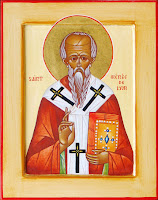 “My entire
period of study in the Society of Jesus was a grim struggle with the dreariness
of theology, with what men had made out of the glory of revelation. I could not
endure this presentation of the Word of God and wanted to lash out with the
fury of Samson: I felt like tearing down, with Samson’s own strength, the whole
temple and bury myself beneath the rubble. But it was like this because,
despite my sense of vocation, I wanted to carry out my own plans, and was
living in a state of unbounded indignation. I told almost no one about this. [My
teacher at the time Erich] Przywara understood everything; [to him] I did not
have to say anything. Otherwise there was no one who could understand me.”
“My entire
period of study in the Society of Jesus was a grim struggle with the dreariness
of theology, with what men had made out of the glory of revelation. I could not
endure this presentation of the Word of God and wanted to lash out with the
fury of Samson: I felt like tearing down, with Samson’s own strength, the whole
temple and bury myself beneath the rubble. But it was like this because,
despite my sense of vocation, I wanted to carry out my own plans, and was
living in a state of unbounded indignation. I told almost no one about this. [My
teacher at the time Erich] Przywara understood everything; [to him] I did not
have to say anything. Otherwise there was no one who could understand me.”
These thoughts
of Hans Urs von Balathasar are taken from his introduction to Adrienne von
Speyr’s journals. His feelings reflect what he saw as dry Thomist theology that
lacked the passion and the fire inherent in the Word.
In Vol. II of
the Glory of the Lord Balthasar
selects five theologies that represent what he sees as preceding the branching
off of the disciplines of theology and philosophy; Irenaeus, Augustine, Denys,
Anselm and Bonaventure. In Vol. III he selects seven whose theologies were
developed after the split of the two areas of study; Dante, St. John of the
Cross, Pascal, Hamann, Soloviev, Hopkins and Peguy. He selects these as
representative of those theologies that project the fire and passion, what he
termed “the glory of the Lord”, he felt
was lacking in the theology being taught at the time.
An example of what
he saw in Irenaeus is taken from Vol. II P.64 – 65:
And from p.74-75:
“This is the source of the central
concept of `glory' as the mutual
glorification of God and man. Man, who preserves God's art in himself and obediently opens himself to its disposing, glorifies the artist and the artist glorifies
himself in his work. `You do not
create God; God creates you. Therefore if you are God's work, wait patiently for the hand of your
artist, who does everything in due
proportion, and in due proportion as regards you who are being made. Offer him your heart soft and pliable, and
preserve the form which the artist forms out of you: preserve it by
keeping yourself moist, so that you do not dry out and harden and lose the
trace of his fingers. Keeping the form that
has been impressed on you, you will move towards perfection, for the clay that is in you will be hidden by the
artist. His hand has created the substance in you, and now it
will cover you inside and out with
pure gold and silver and beautify you so much that "even the king will
lust after your beauty" (Ps 45:11)”

No comments:
Post a Comment